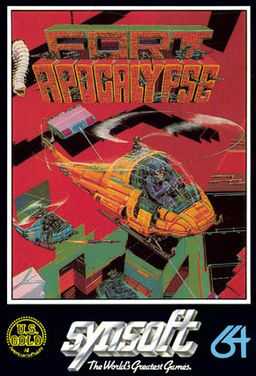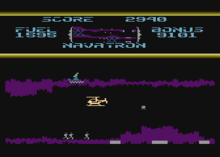Fort Apocalypse
| Fort Apocalypse | |
|---|---|
 Fort Apocalypse cover art (U.K. edition, distributed by U.S. Gold) | |
| Developer(s) | Steve Hales, Joe Vierra |
| Publisher(s) | Synapse Software |
| Designer(s) | Steve Hales |
| Platform(s) | Atari 8-bit, Commodore 64 |
| Release date(s) | 1982 |
| Genre(s) | action |
| Mode(s) | single player |
| Distribution | floppy disk, cartridge, data cassette |
Fort Apocalypse is a 1982 computer game for the Atari 8-bit series created by Steve Hales and distributed by Synapse Software. Joe Vierra wrote the Commodore 64 version the same year. A contemporary of the Apple II game Choplifter, it featured similarities to that game as well as the arcade game hits Scramble & Super Cobra. Fort Apocalypse is a 2-D side-scroller that requires the player to navigate an underground Kralthan prison in their Rocket Copter, destroying or avoiding enemies while rescuing the prisoners.
Gameplay

Like Scramble & Super Cobra, Fort Apocalypse is played within a side-scrolling "cave", and the player's helicopter will be destroyed if it touches the walls. Unlike Scramble & Super Cobra, in Fort Apocalypse the player is free to move in any direction they want, and are not dragged along as the map scrolls, beyond player control. The map is divided into sections by walls that can be broken open by firing on them. Other sections of the map include moving walls and other traps.
As in Scramble & Super Cobra the player has two weapons, a gun and bombs, but only one button on the joystick. Fort Apocalypse solves this problem by having a brief time when the helicopter is turning around where it faces directly forward, at which point the button drops bombs (similar to the interface in the classic Choplifter). Enemies are similar to scramble, but add a number of twists. Missiles will track the player's movements for a short time before running out of fuel and dropping back to earth, and the map is populated by a number of enemy helicopters similar to the player's own.
Reception
Softline praised Fort Apocalypse 's "game complexity and difficulty of play—just enough to keep you coming back and progressing a little further each time".[1]
References
- ↑ Christie, Andrew (Nov–Dec 1983). "Synapse Takes Off". Softline. p. 21. Retrieved 29 July 2014.
External links
- Fort Apocalypse, C64-wiki page (in German)